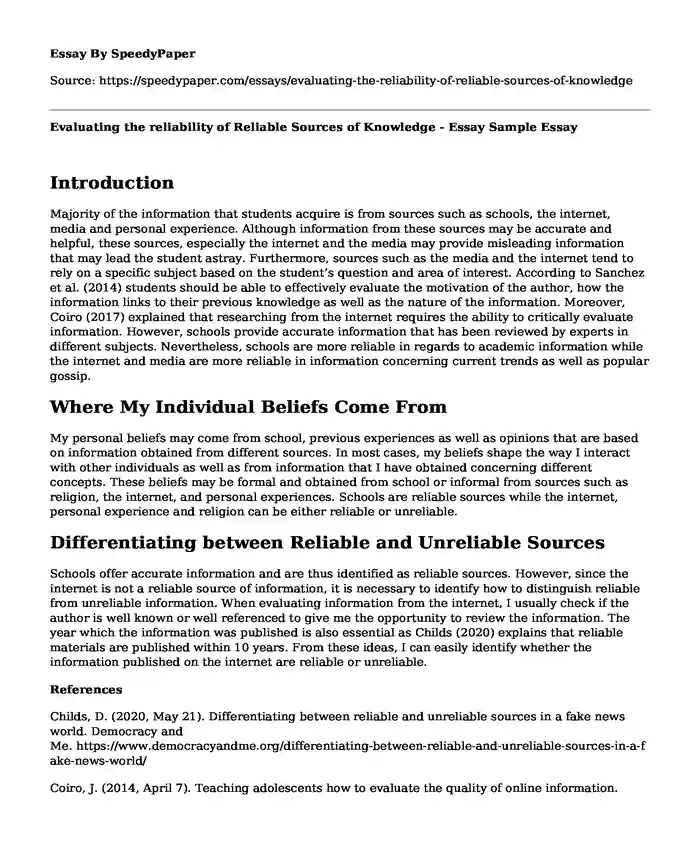
| Type of paper: | Essay |
| Categories: | Education Students Internet School Media |
| Pages: | 2 |
| Wordcount: | 453 words |
Introduction
Majority of the information that students acquire is from sources such as schools, the internet, media and personal experience. Although information from these sources may be accurate and helpful, these sources, especially the internet and the media may provide misleading information that may lead the student astray. Furthermore, sources such as the media and the internet tend to rely on a specific subject based on the student’s question and area of interest. According to Sanchez et al. (2014) students should be able to effectively evaluate the motivation of the author, how the information links to their previous knowledge as well as the nature of the information. Moreover, Coiro (2017) explained that researching from the internet requires the ability to critically evaluate information. However, schools provide accurate information that has been reviewed by experts in different subjects. Nevertheless, schools are more reliable in regards to academic information while the internet and media are more reliable in information concerning current trends as well as popular gossip.
Where My Individual Beliefs Come From
My personal beliefs may come from school, previous experiences as well as opinions that are based on information obtained from different sources. In most cases, my beliefs shape the way I interact with other individuals as well as from information that I have obtained concerning different concepts. These beliefs may be formal and obtained from school or informal from sources such as religion, the internet, and personal experiences. Schools are reliable sources while the internet, personal experience and religion can be either reliable or unreliable.
Differentiating between Reliable and Unreliable Sources
Schools offer accurate information and are thus identified as reliable sources. However, since the internet is not a reliable source of information, it is necessary to identify how to distinguish reliable from unreliable information. When evaluating information from the internet, I usually check if the author is well known or well referenced to give me the opportunity to review the information. The year which the information was published is also essential as Childs (2020) explains that reliable materials are published within 10 years. From these ideas, I can easily identify whether the information published on the internet are reliable or unreliable.
References
Childs, D. (2020, May 21). Differentiating between reliable and unreliable sources in a fake news world. Democracy and Me. https://www.democracyandme.org/differentiating-between-reliable-and-unreliable-sources-in-a-fake-news-world/
Coiro, J. (2014, April 7). Teaching adolescents how to evaluate the quality of online information. Edutopia. https://www.edutopia.org/blog/evaluating-quality-of-online-info-julie-coiro
Sanchez, C. A., Wiley, J., & Goldman, S. R. (2014, May 16). Teaching students to evaluate source reliability during Internet research tasks. Researchgate. https://www.researchgate.net/publication/228351082_Teaching_students_to_evaluate_source_reliability_during_Internet_research_tasks
Cite this page
Evaluating the reliability of Reliable Sources of Knowledge - Essay Sample. (2023, Dec 30). Retrieved from https://speedypaper.com/essays/evaluating-the-reliability-of-reliable-sources-of-knowledge
Request Removal
If you are the original author of this essay and no longer wish to have it published on the SpeedyPaper website, please click below to request its removal:
- Free Essay on Public Relation Case Studies
- Free Essay on the Factors That Influence the Efficacy of Learning Outcomes in Schools
- Essay Sample: The Application of the Red Curtain in the Film 'In the Mood for Love'
- Free Essay about Operation Security Domain
- Essay Sample on Apple Inc.
- Free Essay. I/O Architecture
- Market Mix in Adidas - Free Essay Sample
Popular categories




